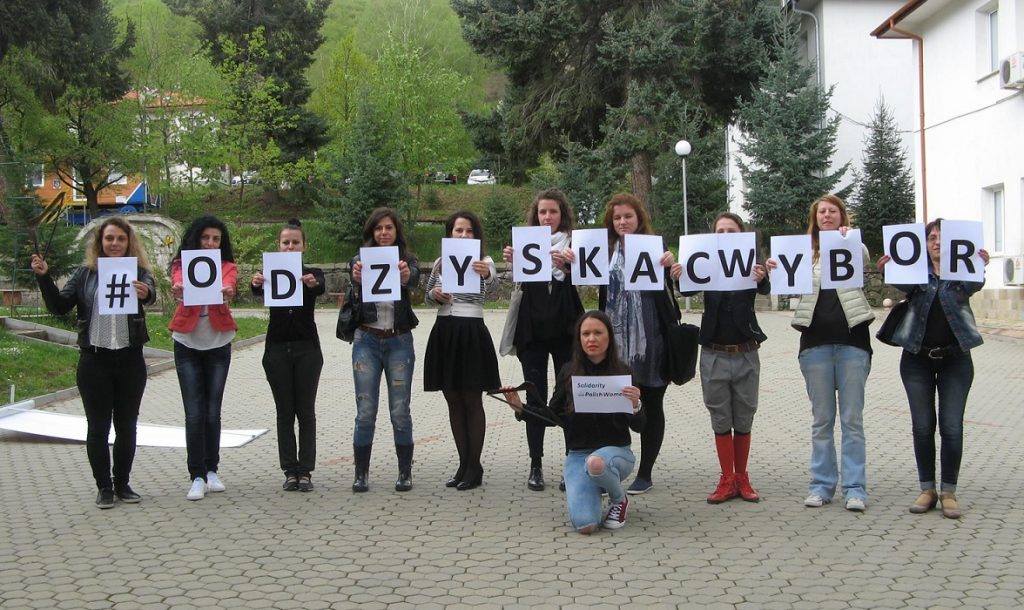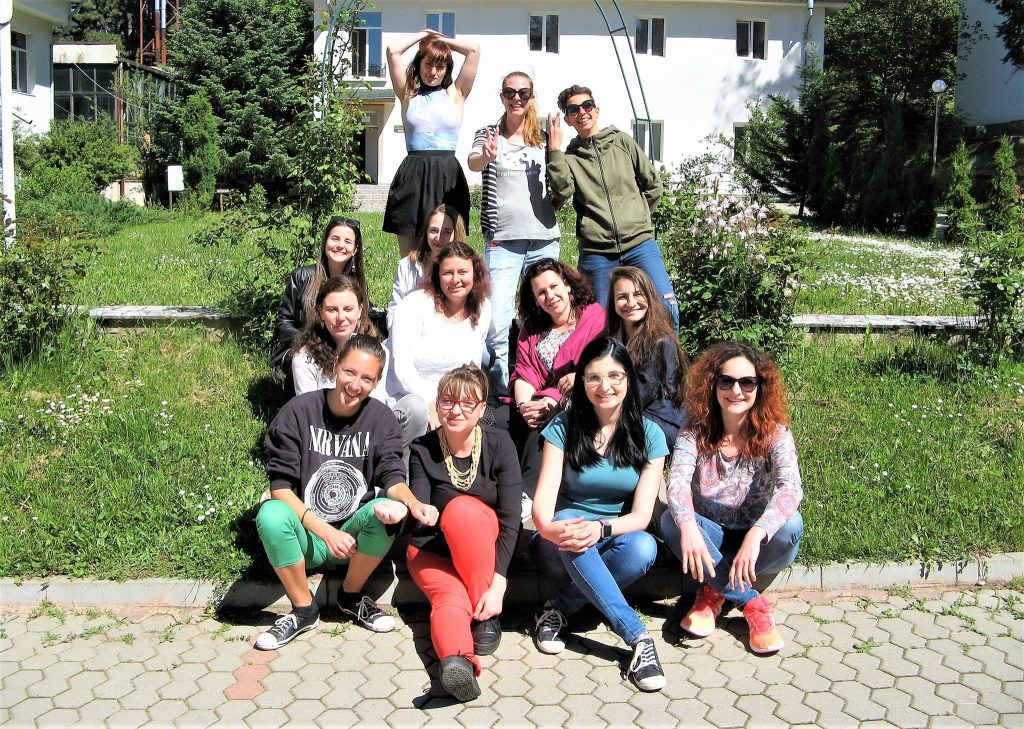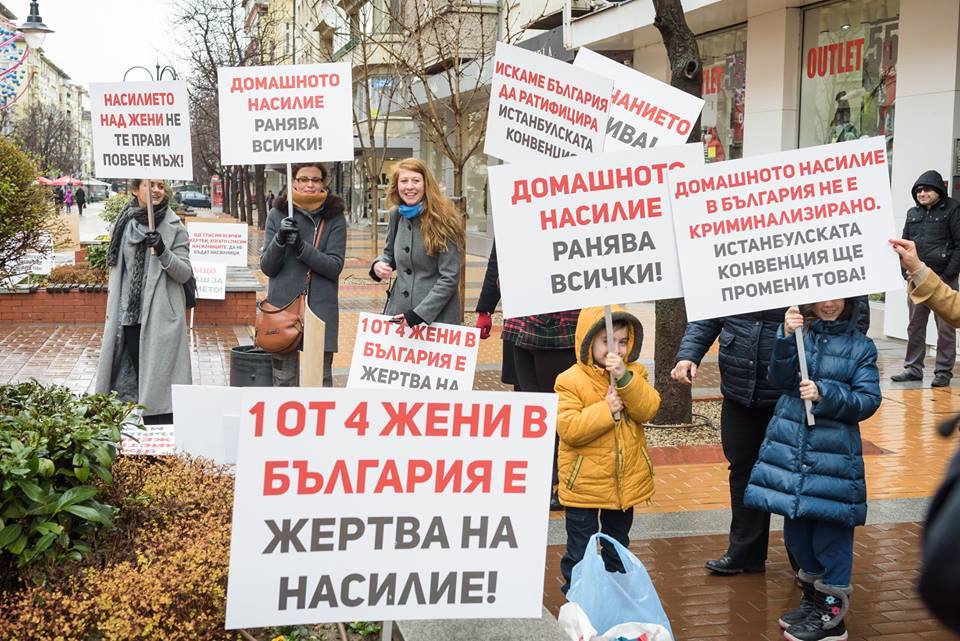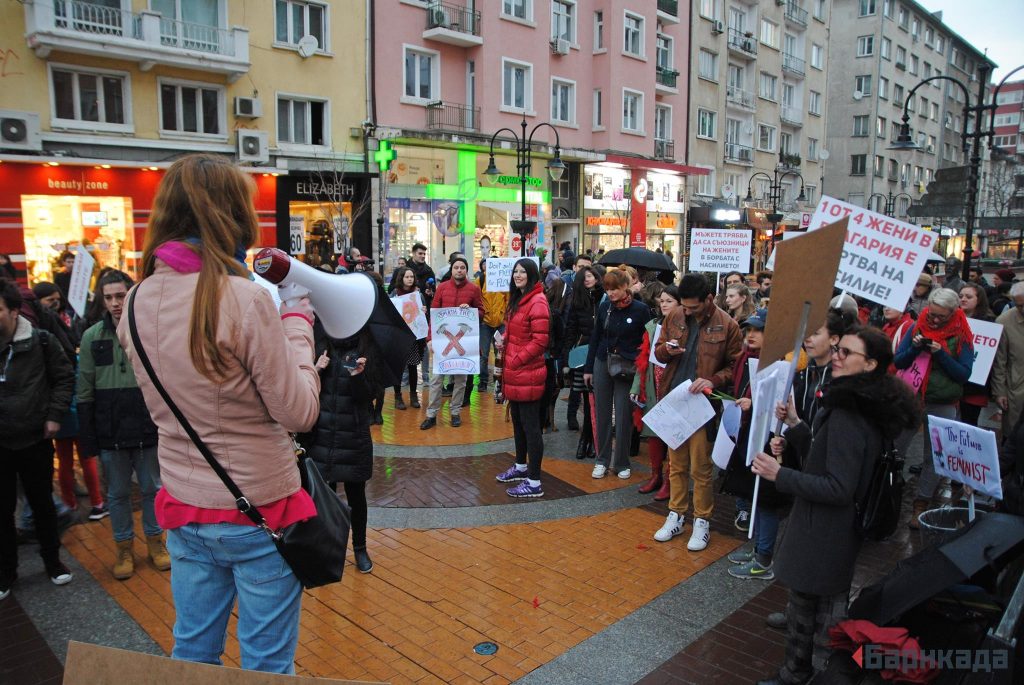Community philanthropy’s role in tackling gender inequality In Bulgaria
27 Oct 2017

“FemPower” BFW staff and partners express solidarity with Polish women
As the only grantmaker in Bulgaria that raises funds and gives grants to local NGOs working to advance women’s and girls’ rights, the Bulgarian Fund for Women’s (BFW) immediate community is made up of non-profit organizations across the country. The following Q & A is based on a presentation made by Gergana Kutseva, BFW’s Development and Communications Director, at the European Community Foundation Initiative conference, held in Cardiff in September 2017.
GFCF: What are the main challenges faced by your constituency in tackling gender inequality in Bulgaria?
Gergana Kutseva: The promotion of gender equality is a controversial issue in Bulgaria. Feminism is often considered a “dirty” word amongst politicians and the public, LGBTQI rights are perceived as being imposed from the “outside” (Western, liberal values are perceived as foreign), sexual education and reproductive rights are a taboo topic for most parents, and any activities aimed at inclusion for Roma women are considered a national betrayal.
- Some of the most important issues faced by our immediate community and the non-profits who we work with on gender issues are:
- The legal and social boundaries that hinder gender equality;
- High rates of domestic violence and the missing legal framework to combat it;
- Social prejudice, patriarchy, nationalism;
- A lack of state and other forms of funding (a recent study from the Open Society Foundations revealed that only 10% of Bulgarians give to charitable causes); and,
- Limited social services and resources for women.
While these issues are well recognized by civil society, national and international organizations, women’s alliances, and by EU institutions, they often stay under the radar of national and local authorities because of their complexity, and the unpopular measures needed to solve them. Most importantly, gender discrimination must be understood in the wider context of poverty, inadequate education and health care, and aging and immigrating local populations, all which require strong political leadership to address, and which to date, is absent.
To counter this, BFW has identified four priority areas: eliminating gender-based violence; political and economic empowerment of women; overcoming gender stereotypes; and, empowering women who face multiple discrimination and/or marginalization.

BFW’s “Feminist Bootcamp” 2017
GFCF: How do you determine who to support, and how important is your grantmaking?
GK: Confronted with inequality in our society and many disadvantaged people, philanthropy is often focused on giving social assistance. At BFW we try to be more strategic in our grantmaking and make social investments that support projects that have long-lasting impact. To do this well, we are very careful, trying to learn more about the local context and our grantees’ needs. We believe it is important initiatives be locally-led and in our case, women-led also.
Through our grantmaking, we aim to embrace all types of groups of women by funding a diverse number of organizations that tackle a wide array of gender related issues. We are very proud of the diversity and inclusive nature of our grantmaking. This past year, we have been able to distribute 36 grants totalling $39,326 USD, which is the highest annual number since the Fund was established, and included 18 new grantee partners.
Most grants went to CSOs (81%) based outside of Sofia, which is crucial for the development of other regions, as the capital is often where resources are concentrated. This year we are awarding our first individual grants to activists as an investment in the potential of young feminists.
GFCF: What sort of difference have your grants made in the communities where you work?
GK: The impact of BFW’s work, and that of our grantees, has been to increase visibility of women’s voices, especially those traditionally marginalized. We believe this is starting to resonant and shift public opinion and debate on gender. High level events, along with research, advocacy and investing in empowering women and girls in leadership roles – which is allowing them to become active drivers of change, instead of being passive beneficiaries – is starting to have real impact. As our grantmaking strives to combine capacity and financial support while securing access for our grantees to different types of resources such as new donors, networks and partners, visibility and media contacts, knowledge and new skills, the impact can have much larger ripple effects.

“Walk a Mile in Her Shoes” initiative 2016
GFCF: Advocacy is a priority for BFW. How have you used the media as an ally in your advocacy and why do you think it is important that CSOs use media outlets?
GK: These are worrying times for civil society around the world as governments seek to demonize NGOs and their foreign funders. Yet community philanthropy can be the sector’s weapon against that. In Bulgaria’s case, there is general skepticism around NGOs, especially those funded by foreign entities, and especially if the NGOS are seeking to engage or challenge local government. Often there can be deliberate media campaigns to undermine the image of such organizations, and to question the source of their foreign funding.
In BFW we face two major challenges: fighting this general mistrust; and, the backlash against feminism. The nurturing and development of local philanthropy can help make us more resilient against these obstacles, and provides an avenue not only to legitimize our local credentials, but also to deepen our understanding of local and immediate issues. That’s why we heavily invest in communication and media engagement. We believe the media can be used as a lever to: #ShiftThePower back to civil society; promote philanthropy; engage in civic action; and, provide tools for achieving democratic progress.
In 2016, we were successful in making women’s rights and the related causes of our partners more visible. This included a wide range of grantees and initiatives, serving to foster the credibility, and illustrate the importance of, the feminist movement. Our efforts involved a highly publicized campaign around women as drivers – breaking the stereotype that they cannot operate vehicles; a Women’s Rights March, the first of its kind in the country; and, a series of interviews with presidential candidates to publically comment on their gender equality agenda.
These communications efforts have helped to position BFW as an important voice for women in the public eye and has given power to our movement. Yet while we increased the power to influence, this also raised the question of where the legitimacy of that power comes from. We continue to make sure we retain our grassroots credibility by listening to our grantees and by being guided by the reality of their experiences.

Women’s Rights March 2017
GFCF: Recently, you received a grant from the GFCF to work on refugee issues as part of an initiative to help build more inclusive communities. Why did you think it was important to be a part of this programme?
GK: Being a women’s fund committed to social justice, we can’t escape difficult and sensitive issues. The issue of migration and the refugee crisis is a sensitive and difficult subject across Europe, including in Bulgaria, but one we felt it was important to engage with. Bulgaria is a country where refugees and migrants from the Middle East are a topical and contentious issue that is often exploited by political parties and sensationalized in the media.
To make matters worse, authorities often shy away from refugee-related problems and they ignore real threats to refugee women and children who fall victim to human trafficking and violence. With the general discourse being damaging and short-sighted, BFW seeks ways to address the issue constructively that promote real actions to battle xenophobia, prejudices and fear. With support from the GFCF, BFW hopes to better tell the refugee story and to better support communities so that they can be more open and accepting of refugees. Working through BFW grantees, the aim is to provoke a constructive and educational dialogue with communities and help to build their capacity with dealing with related social challenges, especially for migrant women and children. The long-term hope is to increase cooperation so individuals can be better accepted, have legal support and successfully advocate for systematic change in how refugees are treated.

